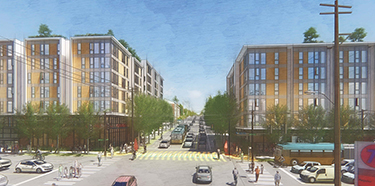|
Subscribe / Renew |
|
|
Contact Us |
|
| ► Subscribe to our Free Weekly Newsletter | |
| home | Welcome, sign in or click here to subscribe. | login |
Environment
| |
 |
September 27, 2018
State helps turn brownfields into affordable housing
Department of Ecology

Warren
|
The state departments of Ecology and Commerce are partnering to work with local governments and communities across the state to promote redevelopment of former contaminated cleanup sites into much needed affordable housing.
For more than 30 years, Ecology has been cleaning up contaminated properties — nearly 7,200 completed cleanups thus far. Removing toxic threats helps protect human health and the environment, and opens the door to put properties back into use.
Ecology is developing the Healthy Housing Remediation Program, which aims to make it easier for affordable housing developers to redevelop once-contaminated properties into housing that communities can afford.
Why it matters
As we all know, Washington — particularly in urban areas — is experiencing a development boom and an affordable housing crisis. And it’s not just larger cities that are experiencing this demand, there is a dire need for affordable housing across the entire state. The state Affordable Housing Advisory Board notes that housing supply and affordability affect all Washington communities, and rents are growing faster than low and middle incomes.
Land availability is a key issue. As Washington’s urban and suburban communities continue to rapidly grow, much of their developable land has already built up into residential and commercial areas. Less densely populated areas face their own housing issues, through their own growth and as people who are priced out of urban centers move outward.
Ecology manages a portfolio that includes more than 13,000 cleanup sites, nearly 6,000 of which still require cleanup activities. Many of these sites represent opportunities to provide residents with safe, affordable housing without displacing them from the communities they call home.
Another key issue is the cost of cleanup and its impact on housing costs. Cleaning up contaminated properties is expensive and often gets embedded in the price of redevelopment. This can create financial barriers to the redevelopment of properties into affordable housing. This program takes the cost of cleanup out of the equation, easing the way for the building of affordable housing.
Legislative support
In support of the critical need for affordable housing, the 2018 Legislature directed Ecology to collaborate with the Department of Commerce and develop a competitive process to fund recipients that restrict the use of their cleaned-up property to affordable housing. The Legislature continued its support of linking cleanups with affordable housing in three additional ways:
• Provided $6.2 million in funding to support the nonprofit Mt. Baker Housing Association’s cleanup of land for the development of The Maddux, a project expected to create 144 units of affordable housing in southeast Seattle.
• Provided funds for Ecology to distribute to local governments to investigate and plan cleanup for potential affordable housing development.
• Instructed Ecology and Commerce to develop a program to carry out more of these cleanups.
We began developing the Healthy Housing Remediation Program in 2018. In June, we reached out to local government representatives and housing groups to begin building a list of possible cleanup projects.
The Maddux
As a site contaminated by releases from a former gas station and dry cleaner, The Maddux development is made possible by a partnership between Mt. Baker Housing and Ecology. This innovative team will achieve multiple goals — including urban environmental cleanup, community redevelopment and transit-oriented affordable housing — and will serve as a catalyst for transforming the Mount Baker neighborhood. In fact, this project laid the groundwork for the idea of creating the pilot program.
The new residential complex is an exciting example of the potential for turning contaminated properties into community- and transit-oriented housing opportunities. The property, while contaminated, occupies an otherwise desirable location — known as a “prominent corner” in real-estate parlance — which has easy access to mass-transit options and walkable green spaces.
Cleanup of the Mount Baker property means that this location will not only continue to serve the long-term neighborhood residents who have lived with the presence of contamination, but will also provide new affordable units and economic opportunities for small businesses by including ground-level commercial spaces in an area with limited retail services.
Ecology and Mt. Baker Housing have worked closely together. We helped our partners understand the cleanup process and funding opportunities available to support this work.
Ecology provided $400,000 in early financial support through a prospective purchaser consent decree that helped Mt. Baker Housing investigate contamination on the site and plan cleanup needs. The initial investment and Mt. Baker Housing’s efforts secured $56 million in private, federal and state housing funding, which the Legislature supplemented with $6.2 million to pay for cleanup costs. These cleanup funds assisted Mt. Baker Housing in providing all 144 units in the new building at affordable prices. Final cleanup investigations were in process at press time, with cleanup construction expected to start in summer of 2019.
Ecology is proud of its work protecting Washington’s human health and the environment, and — through cleanup grants to local governments — enabling economic development. Now, through partnerships like the Healthy Housing Remediation Program, we can also join with local governments and nonprofits to help turn contaminated properties into clean sites for affordable housing.
Bob Warren is Northwest Regional Office section manager and interim program manager for the Washington Department of Ecology Toxics Cleanup Program.
Other Stories:
- Infiltration maps streamline land-use planning
- Survey: O’Brien & Co.
- Survey: Shannon & Wilson
- Survey: Paladino & Co.
- Survey: Landau Associates
- Facebook’s new home will have 1st Salmon Safe woonerf
- Bold actions are needed to save local orcas
- Accelerating cleanup with adaptive management
- 10 years later: Weber Thompson’s HQ is better with nature
- More buildings set their sights on net zero
- Survey: Parametrix



